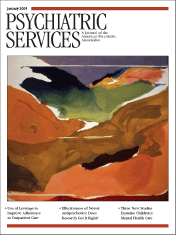Gender Identity and Implications for Recovery Among Men and Women With Schizophrenia
Abstract
The concept of gender considers masculinity and femininity as a cultural construct that varies along a continuum. Subjectively perceived, gender may affect the experience of illness among persons with schizophrenia and may have an impact on treatment and recovery. This study evaluated gender identity, according to the Bem Sex Role Inventory, among 90 men and women with schizophrenia and schizoaffective disorders. The findings indicate that persons with schizophrenia experience their gender identity in ways that vary from culturally normative standards. Both men and women scored lower on traditional masculine descriptive measures compared with persons without schizophrenia. This finding has important implications for recovery.



